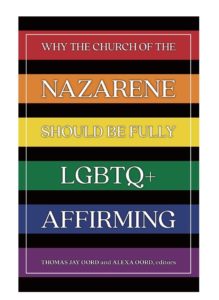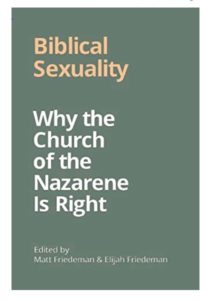

I have written previously of my history and experiences within the Church of the Nazarene. In my 45 year journey with Jesus, my time spent within those circles appears minimal. Seven years of education (B.A. and M.Div) and almost 5 years of pastoring (Ohio and California) only create approximately 25% of spiritual input. However, that 25% left marks on me that were both beneficial and detrimental. I have tried, in as much as one can, to be fair, objective, and gracious in my reflections through the years. No earthly institution is perfect because it is run by broken, sinful, and dysfunctional people. No matter how loud or often you preach the doctrine of entire sanctification, you cannot escape that reality. I preface the blog with these remarks because I find it painful to comment on a movement based on a book which it had no hand in creating, at least, not a direct hand; but there lies the problem. While the Oords’ latest book, “Why the Church of the Nazarene Should Be Fully LGBTQ+ Affirming”, is not denominationally sanctioned, it certainly found its germination within its soil. The book contains essays and chapters written by former and current Nazarene elders and while Oord is no longer teaching at a Nazarene University, he is still ordained and credentialed within its ranks.
I need to say at the onset, the grassroots of the Church of the Nazarene has always been in general, theologically and culturally conservative. In like manner, many local church pastors, in fact everyone that I have ever interacted, have also been theologically conservative, Bible-affirming shepherds. You may not subscribe to their Wesleyan-Arminian construct, but like Wesley, I have found them to be Homo Unius Libri, or a people “of one book”. So, I want to be careful that a new, trendy book release on embracing LGBTQ+ from an ex-Nazarene academician isn’t automatically conflated into a systemic denominational problem. That is neither fair, accurate, nor charitable. In fact, a response was offered by Matt and Elijah Friedeman entitled, “Biblical Sexuality: Why the Church of the Nazarene is Right”, which is an attempt to respond to Oord’s and others attempts to mainstream LGBT acceptance into the denomination. Add on top of that my genuine appreciation for the influence Nazarenes had in my early Christian journey, my hope is that my comments are not construed to be that of a cranky armchair analyst. Again, I am on record on this blog site of my appreciation of this spiritual heritage.
However, while the Nazarenes cannot be indicted for the contents of this new book, they do, in my opinion, face an important crossroad. Perhaps it is analogous to the “narrow road” and the “wide road” that Jesus references. Maybe it is better illustrated by the choice between the “big tent” and the “smaller tent”. Whatever analogy one chooses, it opens the discussion of what is a “bridge too far” theologically to remain a fervent, Bible-believing, conservative, evangelical denomination? This crossroad has been on the horizon for some time now and it seems like the moment to set a directional rudder has arrived. In fact, I would suggest that the whole “woke” invasion is a challenge just about every evangelical denomination needs to be prepared to address. This is not a uniquely Nazarene issue.
I observed this coming crossroad from my own experiences years ago, along with the relationships which I have maintained through the years, as well as some new friends who worship and serve within the COTN. I know there are concerns from numerous vantage points.
The Nazarene crossroad originates, in my humble opinion, from their educational institutions. It’s the same challenge the Jews faced when they found themselves in exile. How do you live in Babylon without being influenced and absorbed into Babylon? How do you train your tribe, when most of your teachers have been trained in Babylon? How do you maintain fidelity to a Kingdom when you are in another land? To some extent, Nazarenes are following the trajectory of their Wesleyan cousins, the United Methodist Church. The day has arrived for many Methodist congregations to choose which path they will traverse. Will it be the liberal, theologically progressive path of undiscerning inclusion and the diminishing of Biblical authority -or- the traditional, conservative path of evangelical Christianity which affirms Biblical authority and in many member’s minds, Scriptural inerrancy?
I first became aware of this internal struggle while studying in Nazarene institutions in the late 1970’s and early 1980’s. I was a new convert and certainly naive and unsophisticated to the ways of denominational politics and diversity. I assumed my earliest professors were representative of all Nazarene professors found in their numerous regional universities and notable seminary. My born-again innocence presumed that everyone calling themselves a “Nazarene” must be on the same page doctrinally and theologically. That was simply not the case. Nazarenes are not monolithic by any stretch of the imagination. In fact, the Nazarene college I attended was relatively new compared to several of their sister universities which had been established for some time. It was a well-known “secret” amongst the religion majors that the one of the reasons this school was started was due to the perceived drift of the older schools into what we would define in that era as liberalism. Whether this was true or not, I have no way of corroborating, but I can attest to the fact that it was a well accepted account of many of my Nazarene friends.
This dynamic became all the more established in my thinking as I attended the Nazarene Seminary and interacted with ministerial students from across the Nazarene educational landscape. Graduates from certain Nazarene Universities were definitely more at ease with liberal theological positions than I. There seemed to be a spectrum across the entire student body and faculty. In fact, it appeared to me that within each academic area (Theology, History, Old Testament, New Testament, etc.) there were two professors to oversee and teach those disciplines. These two professors seemed to represent polar opposites of the liberal/conservative spectrum. In other words, we, as the student body, understood that whichever professor’s class you registered for, you knew instantly the perspective you would hear. Was that intentional or coincidental? Was it simply a matter of receiving a broad scope of thought and education or was it an attempt at maintaining as large a tent as possible? I do not know. But what I do know is the following: (Please remember this was 40 years ago)
- There was incredible institutional consternation over the word “inerrancy”. We were constantly reminded that as Wesleyan pastors we believed in soteriological infallibility, but not textual inerrancy. This, for me, was problematic.
- A professor who clearly and unambiguously taught that the pro-choice position concerning abortion was not only integral, but biblical. In fact, I wrote a 65-page term paper which outlined a compelling case for life at conception and the professor gave me a C- citing sophomoric reasoning and lack of compassion. I understand that term papers can be a subjective thing to a professor, but when pro-choice papers were getting A’s based only on perspective, that too, is problematic.
- A theology professor who made provision for homosexual proclivities. At the time he stopped short of defending homosexual practice, but later in life published that exact fact. As difficult as this is to write, he did endorse in one particular class self-pleasuring as well.
- An Old Testament professor claimed the Red Sea event was actually a mistranslation indicating that the crossing happened at the “Reed” Sea which was significantly shallower than the Red Sea assumption. He also undermined all the supernatural events of Exodus to be “coincidental” natural phenomena. This instruction was institutionally ignored.
- “Theistic evolution” (so-called) was uncritically accepted and taught. Young earth possibilities were eschewed and patronized regularly.
- Several students were graduated who denied the virgin birth, saw the resurrection as likely myth, and completely rejected plenary inspiration of the Scriptures under any theory. These men were to be pastors in the COTN.
- The beginning foundations of both Open Theism (which denies or redefines God’s sovereignty) and Process Theology (which gives space for God to grow in knowledge and undermines omniscience) was finding a more prominent place.
- The seamless ease with which students at the Nazarene Theological Seminary could cross register with the local (very liberal) United Methodist Seminary for classes with little thought of doctrinal incompatibility.
- At least two chapel services (to my recollection) where conservative politicians were publicly rebuked or criticized and liberal politicians affirmed. This is not to say that conservative politicians do not need a healthy rebuke, but everyone knew that the political milieu of the school was progressive. The few token conservative students would often chuckle about our minority status.
I suppose the list could on and I will admit these are one person’s anecdotal stories, but hopefully my point is being illustrated. My suspicion unfortunately, is that the progressive ideology may well be entrenched significantly more as the Oord firing from his educational post in a Nazarene institution has only happened recently. To use another illustration, just as factories which released waste into Lake Erie eventually caused it to be declared a dead lake in the 1960’s, there has been a stream of unorthodox instruction flowing into the lake of the COTN from its educational institutions for decades which has slowly produced similar results. The question (or crossroad) has emerged, will there be a “Clean Water Act” to reverse this dynamic and will my friends choose the road less traveled to maintain fidelity and orthodoxy. The COTN could once again be a powerful denomination, but the hour has arrived to choose a path. Why choose and why now? Because every institution in America is coming to this same crossroad in our era concerning LGBTQ+ acceptance and celebration. The Church must lead the way in offering clarity and scriptural fidelity. We cannot leave this battle to the politicians alone. They have a place in this worldview battle, but they are not the only participants. Pastors and denominational leaders from every evangelical fellowship need to arise and speak unambiguously to these issues.
Now the question may arise, as to why should I care what the COTN should consider seeing that I have no official connection to it? Is it any of my business? Should I just keep my nose out of it?
Oord’s book is a harbinger, I believe, that needs to be unveiled and directly challenged. It is undoubtedly also a harbinger for all theologically conservative denominations and evangelicalism at large. Since he brought the topic forward and linked the COTN in its crosshair, a vigorous response needs to be offered by those in Nazarene leadership. In much the same way J. Gresham Machen wrote his seminal book, “Christianity and Liberalism”, in 1923 to address the drift of his Presbyterian Church or Harold Lindsell’s 1976 book, “Battle for the Bible”, which cautioned evangelicals at large to watch the drift away from scriptural inerrancy, perhaps voices of concern can influence the trajectory of Wesleyanism in general and the COTN in particular. The Friedemans have certainly started this response, but the defined leadership of the denomination now needs to step up. It is no secret that the once mighty and fervent United Methodist Church is facing a painful split within its own ranks over LGBT issues. Will this be a prophetic picture of the COTN?
Paul the apostle himself wrote that we are…
“casting down arguments and every high thing that exalts itself against the knowledge of God, bringing every thought into captivity to the obedience of Christ,”
2 Corinthians 10:5 NKJV
As a pastor, I voluntarily left the COTN in 1989, over doctrinal challenges of which I saw no reconciliation. I made no fuss, caused no division, and as peacefully as possible determined to follow God according to Scriptural conviction. It wasn’t easy and truthfully I am fairly certain there were no tears from denominational leadership. I was a small fish in those circles (and honestly still am). My presence or lack of it wasn’t a game changer for this Wesleyan juggernaut.
That said, almost 35 years later I am finding the Lord is graciously renewing a number of pastoral relationships within the COTN stable of ministers. Invitations to preach behind certain local Nazarene churches have been extended. I am facilitating a growing number of Nazarene ministers in civic ministry to their elected officials. My own daughter is on staff at a great Nazarene church. For me, there is a feeling that I am coming full circle to the COTN for some meaningful purpose. What that purpose may be, I have no idea, but I cannot escape a certain divine irony in this moment. And I am also surprised that I would sense any need to exhort those Nazarenes who might stumble across this article to arise and battle for your great denomination and its purpose in both the Kingdom of God and this nation. I am normally the guy who finds a seat at the top of the bleachers with a box of popcorn to watch the inevitable crash. My cynicism is melting on this occasion to hope that perhaps courageous and spiritual men and women will find their voice and defend the faith once given. How about it? Can we stop Wesley from spinning in his grave and defend this great biblical heritage? I am rooting for your success.
I would encourage any reader that if you have updated information or insight to feel free to comment below. I am genuinely interested and genuinely praying for my Nazarene friends.

TerryKinnett Kinnett
June 3, 2023 at 8:16 pmGreat insight Kevin, the church better wake up and take a stand.
Kevin Baird
June 4, 2023 at 1:50 amThanks for stopping by Terry. Yes, hopefully the COTN will get the rudder right.